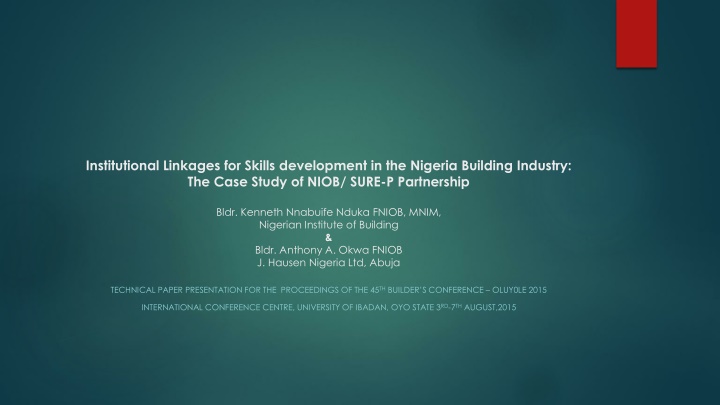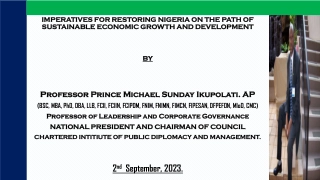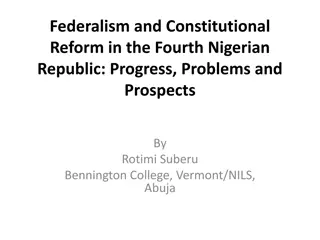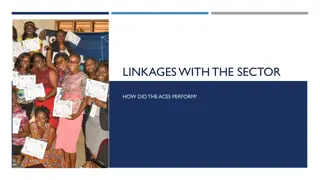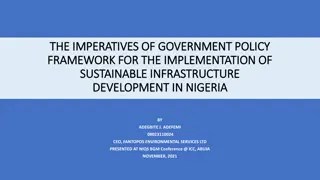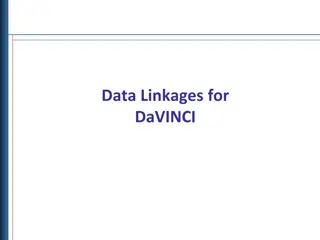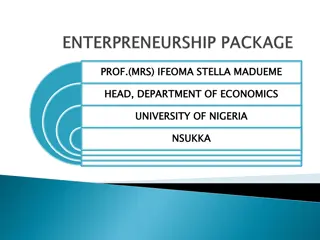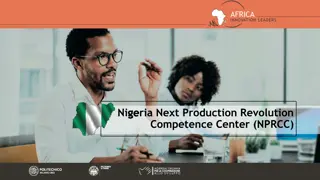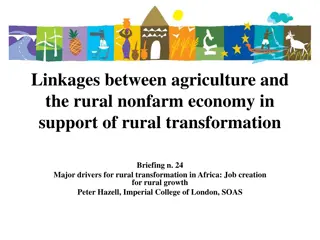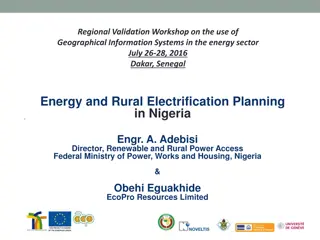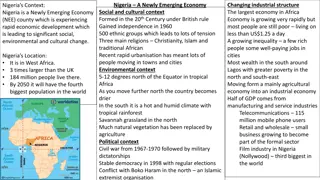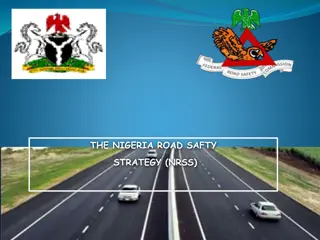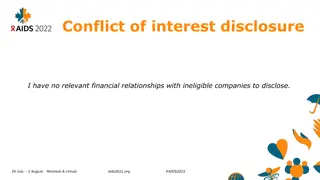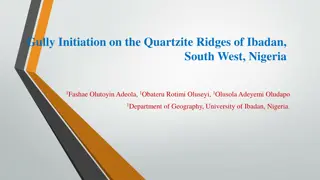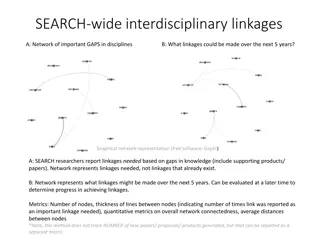Institutional Linkages for Skills development in the Nigeria Building Industry: The Case Study of NIOB/ SURE-P Partnership
The paper discusses challenges faced in Nigeria's building industry and the success story of the NIOB/SURE-P partnership in addressing skills development. It highlights the program's structural overview and implementation challenges.
Download Presentation

Please find below an Image/Link to download the presentation.
The content on the website is provided AS IS for your information and personal use only. It may not be sold, licensed, or shared on other websites without obtaining consent from the author.If you encounter any issues during the download, it is possible that the publisher has removed the file from their server.
You are allowed to download the files provided on this website for personal or commercial use, subject to the condition that they are used lawfully. All files are the property of their respective owners.
The content on the website is provided AS IS for your information and personal use only. It may not be sold, licensed, or shared on other websites without obtaining consent from the author.
E N D
Presentation Transcript
Institutional Linkages for Skills development in the Nigeria Building Industry: The Case Study of NIOB/ SURE-P Partnership Bldr. Kenneth Nnabuife Nduka FNIOB, MNIM, Nigerian Institute of Building & Bldr. Anthony A. Okwa FNIOB J. Hausen Nigeria Ltd, Abuja TECHNICAL PAPER PRESENTATION FOR THE PROCEEDINGS OF THE 45THBUILDER S CONFERENCE OLUY0LE 2015 INTERNATIONAL CONFERENCE CENTRE, UNIVERSITY OF IBADAN, OYO STATE 3RD-7THAUGUST,2015
INTRODUCTION The peculiarities of Nigeria s Buiilding Industry high population with unpredictable demographic spread.. quantitative and qualitative mismatch of skills supply and demand Poor economic climate and influence of multinationals. apparent disconnect between TVET initiatives and industry needs,. International migrant labour challenges and national security
CONSTRUCTION INDUSTRY CHALLENGES AND THE NEED FOR SKILLS DEVELOPMENT The industry is the first casualty of economic downturn. heavy reliance on a large pool of manual labour dynamic changes in production materials, endless innovations in delivery technologies and methodologies, Uniqueness of building designs and peculiarities of outcomes , Characteristics of construction sites topography, geophysical properties, accessibility, etc. Irregular flow of building jobs. Rivalry and role usurpation amongst built environment professionals. Growing general resistance to multi-skilling. Negative competetion among major key industry players
The NIOB/ SURE-P LINKAGE: A STRUCTURAL OVERVIEW SURE-P : Federal Government Safety-net initiative. NIOB the PREFERRED trainer for 1000 trainees MoU the instrument for partnership and responsibility sharing The Programme Delivery Strategy PLANNING STAGE PHASE 1 PHASE 2. OTHER INTENDED SPICES TO THE PROGRAMME. Implementation challenges and associated drawbacks
THE SUCCESS STORY No doubt, these changes were sufficient to frustrate the program, but the felt need for this intervention motivated the Institute to decide to proceed, almost to the chagrin and surprise of the sponsors. The event enjoyed very wide publicity . The NIOB and CORBON invested in political capital. The artisans keyed into the programme and in some zones even took ownership . Intra zonal interface between State Chapters in the zones blossomed. The state Chapter Chairmen were for once directly challenged with national assignment, and they delivered. The programme training modules prepared in booklets will serve as a patented resource material of the Institute . The artisans were registered and encouraged to form associations that will be responsible to the respective NIOB chapters/zones.
CHALLENGES OF IMPLEMENTATION 1. The impromptu kick off of the programme. 2. The duration of the program was compromised. 3. The programme implementation was starved of funds. 4. Security challenges in the North East zone. 5. The second level training at state levels could not materialize.
CONCLUSIONS The need for responsive industry wide skills development and training justifies the need for such institutional linkages as the NIOB/SURE-P program and, the direct involvement of the appropriate professional body gices it the coloration of seriousness and uniqueness. The seemingly tortuous process placed a lot of demand on all those involved, and exposed the disconnect between stakeholders particularly employers, who the sponsors did not deem it necessary to involve. One of the unbelievable throw-ups of the programme is the dearth of requisite infrastructure even in federal establishments, specifically set up to provide these and The absence of a central industry wide body to define and establish a qualification framework that will be set against required competencies, and capable of being cross matched throughout the skills value chain across the board. The development limits the employment opportunities and effective mobility of beneficiaries of many of these programs. The ease with which NIOB was able to reach out to other establishments including the NBRRI, ITF, Ibadan and Kaduna polytechnics serve as abject lesson and testimony to what can be achieved through effective institutional linkage The irregularities that associated the planning, budgeting, releasing, management and control of the funds for the programmes on the part of both NIOB and SURE-P presents a frontier for further studies on how scarce investible funds meant for Institutional linkage initiatives should be commensurately estimated, purposefully dedicated, responsively allocated, and diligently accounted for. The institutional linkages between NBTE, and NIOB, on one hand, and between NIOB and SURE-P on the other, excited the resultant approval granted NIOB by NBTE to operate as the approved NVQF awarding body for building trades skills and development. NIOB, and by extension all builders, are accordingly presented with the long sought-after wider platform of opportunities for extensive professional services delivery, even as trainers, assessors and verifiers, in fulfilment of the National Building Code(NBC) provisions and mandates.
RECOMMENDATIONS It is hoped that the highlighted outcomes of the programme will help to: Due strategy to document and organize the vast population of building trades artisans and craftsmen for continued upskilling to be hammered out, The role of NIOB as an awarding body under the NBTE prescribed National Vocational Qualification framework to be consolidated. Sustained advocacy campainsto be Building industry stake holders, banks, funding agencies, and organs of government to ensure that adequate financial resources are availed through responsive budget prioritization for the sustenance of skills development projects in Nigeria. 4. Cause government organs, at all levels, to situate properly worked out sustainable policy thrusts, including tax rebates, and other NON CORRUPT special business concessions to organisations that key into desired linkage agreements for the skills development and training of artisans and craftsmen, to create employment, as well as upgrade the quality and quantity of those that are already in employment. The approach, if adopted, will stimulate interests for involvement, improve production of this unique class of human capital that is critical for growth and poverty reduction, and accordingly impact the oft touted development agenda priorities for the competitiveness of quality goods and services produced in the country, most positively. Prompt building industry stakeholders to key into the skills development and training programme by availing their facilities for training as well as showing willingness to accept trainee placements and or offering employments to certified graduands. No doubt the commitment of employers to hire persons trained to meet the needs of the industry is imperative if the intended good results must be enjoyed.
RECOMMENDATIONScontd. Finally, if institutional linkages in skills development in Nigeria s construction industry must effectively thrive, if we must harness and harvest the opportunities offered by our bourgeoning youth population, if must stand the pyramid of building construction industry on its proper base, and if according to Fashola(2013), we must join the league of prosperous great nations that are built by skilled artisans and craftsmen, then we must pay very serious attention to the activities of artisans in the following ways, among others, a la Alaska Model. Situate a data bank that captures trade-by-trade quantity, peculiar competencies and skills, and demographic spread, of our artisans and craftsmen. It is by so doing that we will be able to monitor our workforce skills gaps. Increase the access to industry wide information, support services, training and employment through effective outreach and marketing of construction related occupations and careers. II. Provide and implement a nation wide acceptable quality education and training model that provides Nigerians with the requisite skills necessary to competitively secure employment in construction related occupations. III. Obtain employment for all who successful complete training and demonstrate that they have the skills necessary to be competitive in Nigeria s labor force and beyond. Insure that Nigerians who choose to enter the construction workforce have the supports necessary to complete training and stay in the workforce. Set up industry-standard-targeted central board, with stakeholder shared values, privately run by the industry stakeholders to monitor the industry operators and provide oversight for skills training development plans, and programme implementation such that the operations of the member organisations will not be frustrated by arbitrary training schedules THANK YOU LISTENING - Bldr Kenneth Nnabuife Nduka FNIOB
